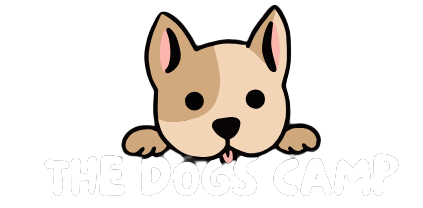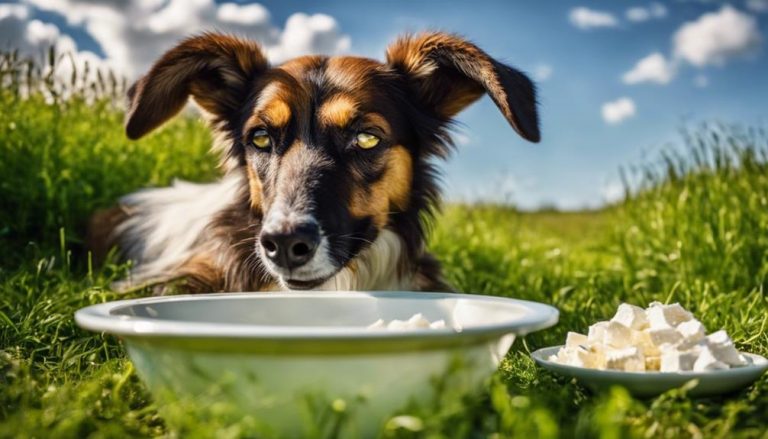Goat Cheese: Dog-Safe Moderation Tips
Dogs can enjoy goat cheese in small amounts. This cheese offers proteins, fatty acids, and vitamins which are good for their bones and muscles. But, because it has lactose, along with a bit of sodium and fat, it’s best to give it to them sparingly. Choose plain goat cheese without any added flavors or spices to keep it safe for your pet.
Serving your dog a small quantity of goat cheese can help avoid issues like lactose intolerance reactions, unwanted weight gain, and digestive troubles. It’s crucial to watch how your dog responds after eating goat cheese and then decide if it’s okay to include it in their diet occasionally. This approach helps in keeping your dog healthy while letting them enjoy a tasty treat.
Key Takeaways
- Goat cheese isn’t harmful but limit due to lactose and fat.
- Opt for mozzarella or cottage cheese for easier digestion.
- Always select plain goat cheese and watch for allergies.
Understanding Goat Cheese
Goat cheese offers a wealth of nutrients like protein, fatty acids, magnesium, calcium, and phosphorus, making it a nutritious addition to your dog’s meals. These nutrients are key for maintaining strong bones and muscles, crucial for your dog’s health. The cheese’s soft texture also makes it easy to hide pills when your dog needs medicine.
However, pet owners should be cautious. Goat cheese isn’t toxic to dogs, but it does have lactose, along with high levels of sodium and fat. These can cause health problems if dogs eat too much. It’s vital to keep an eye on how much goat cheese your dog eats to prevent any issues.
Safe Cheeses for Dogs
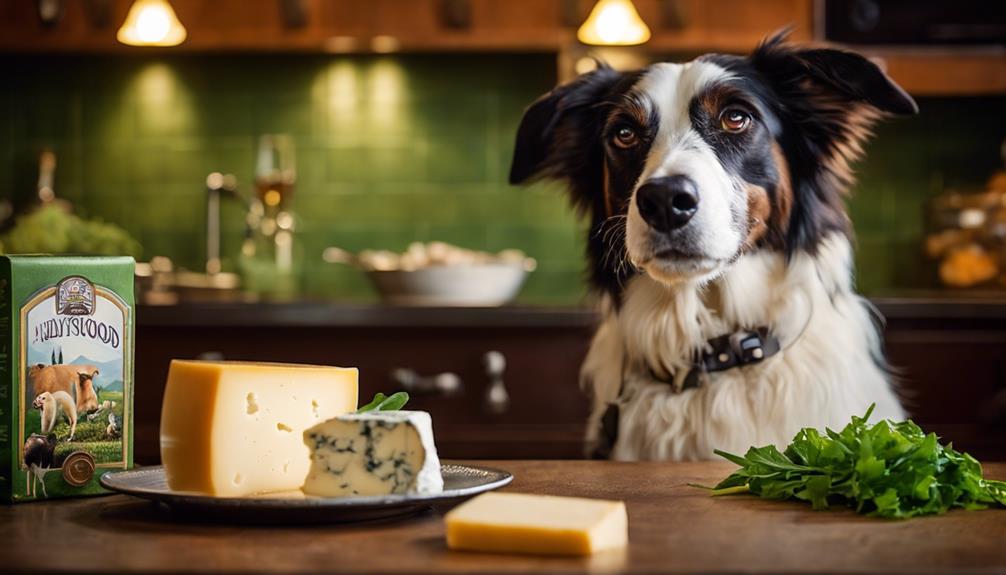
When thinking about adding cheese to your dog’s meals, it’s key to know that not all cheese is good for them. Some types can be healthy and safe, while others might not suit their digestive system. The amount of lactose, fat, and any extra ingredients in the cheese can affect whether it’s a good choice for your pet. This part will look at the kinds of cheese that are usually safe for dogs, keeping their health in mind.
Low-lactose cheeses like mozzarella or cottage cheese are often easier on a dog’s stomach. These cheeses have less lactose, meaning they’re less likely to cause digestive troubles. However, it’s still important to give these cheeses in small amounts. Overfeeding cheese can lead to weight gain and other health issues in dogs.
Always check for additives or seasonings in cheese, which can be harmful to dogs. Cheeses that are plain and simple are the best options. Avoid giving your dog any cheese that contains onions, garlic, or chives, as these can be toxic to them.
Cheese Types for Dogs
When considering what to feed dogs, it’s crucial to remember that not all cheese is good for them. However, goat cheese is a nutritious option that’s generally safe for dogs if given in moderation. It’s packed with protein, essential fatty acids, magnesium, calcium, phosphorus, and B vitamins, which can all support a dog’s overall health.
It’s worth noting that goat cheese does contain lactose, which might not agree with dogs that are lactose intolerant. So, it’s best to give dogs plain goat cheese in small amounts to prevent any upset stomachs. The soft texture of goat cheese is also handy for hiding pills when you need to give medicine to your dog, making it a practical choice for pet owners.
Health Considerations
Goat cheese can be a tasty and nutritious snack for dogs, packed with proteins, magnesium, calcium, phosphorus, and B vitamins that are great for their health. However, it’s vital to consider the bigger picture when incorporating cheese into your dog’s diet. This includes understanding potential issues like lactose intolerance and the dangers of too much fat and sodium.
Although goat cheese offers many health benefits, its lactose content and high levels of sodium and fat could cause problems if dogs eat too much of it. The amount of goat cheese that’s safe for a dog depends on factors like their age, size, and general health status. Pet owners should be careful with how much cheese their dogs consume. Ensuring that goat cheese is given in small quantities can help prevent any negative impact on your dog’s health.
Risks of Goat Cheese
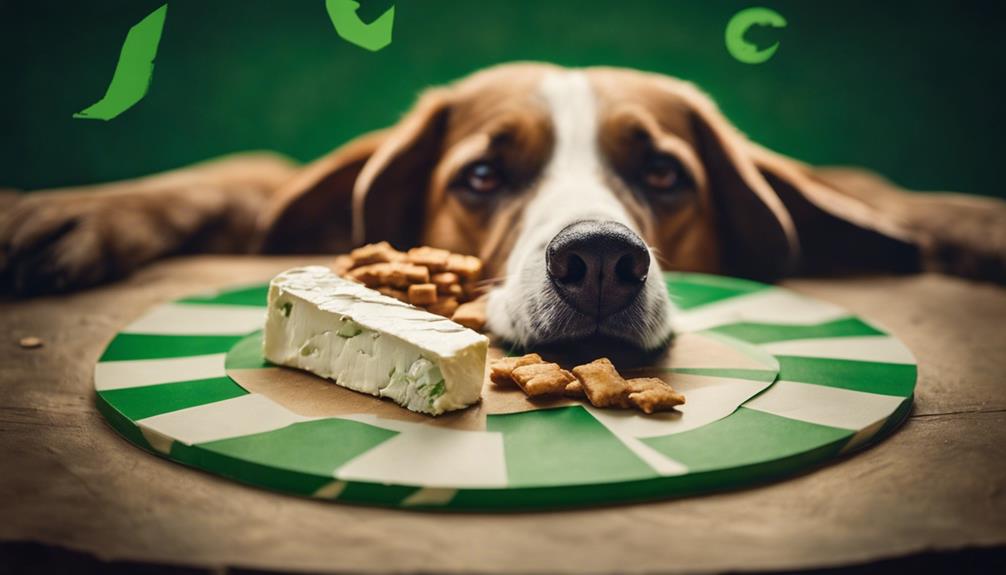
Goat cheese might seem like a delicious snack for some dogs, but it comes with its share of concerns. Dogs that have trouble digesting lactose could end up with stomach problems if they eat goat cheese.
It’s also rich in fat and sodium, which could lead to weight gain and other health issues if dogs eat too much of it.
That’s why it’s key to watch how your dog reacts to goat cheese and to only give it in small amounts.
Lactose Intolerance Concerns
When thinking about giving goat cheese to dogs, we need to consider its lactose content. This is because dogs, especially those who can’t tolerate lactose well, might get digestive problems from eating goat cheese.
The high sodium and fat levels in goat cheese also raise concerns about obesity in dogs, which means it should only be given in small amounts.
What’s more, some goat cheeses you find in stores might have additives that aren’t good for your dog’s health. It’s crucial to watch how your dog reacts to a small amount of plain goat cheese. If they show any signs of health issues, it’s best to stop feeding it to them to ensure they stay healthy and happy.
High Fat Content
Addressing concerns related to lactose intolerance is crucial, but it’s also necessary to consider the health risks associated with the high-fat content in goat cheese for dogs.
Goat cheese, though tasty, is rich in fats which could lead to obesity and other health problems if dogs eat too much of it. Eating too much high-fat food might cause weight gain and health issues like pancreatitis, which gets worse with a lot of fat in the diet.
It’s crucial to use goat cheese in moderation in a dog’s diet to avoid these health issues. Dog owners should keep an eye on how much goat cheese their dogs eat to keep their pets healthy.
Salt Content Risks
Even though goat cheese has less sodium than many other cheeses, it’s still not great for dogs in big amounts. This is because too much salt can lead to health problems like high blood pressure and dehydration.
When feeding your dog goat cheese, keep the portions small to avoid these issues. The amount of sodium in goat cheese can change a lot depending on the brand and how it’s made, so always check the label.
Cheese Feeding Guidelines
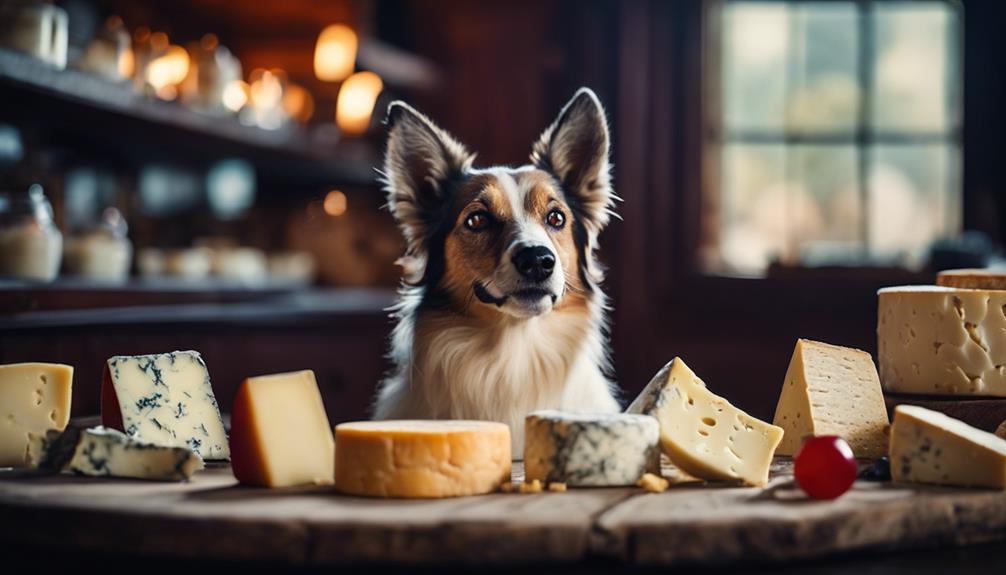
When thinking about adding goat cheese to your dog’s meals, it’s crucial to do so carefully to keep your pet healthy and safe. Goat cheese isn’t harmful to dogs and comes packed with nutrients like protein, essential fatty acids, and vitamins such as B vitamins, magnesium, calcium, and phosphorus. Its creamy texture is also great for hiding pills when you need to give your dog medication. However, it does contain lactose, which some dogs might have trouble digesting.
If your dog is lactose intolerant, it’s best to avoid goat cheese altogether. For dogs that can digest lactose, make sure the goat cheese is unflavored and given in small amounts. This is because goat cheese has less fat and lactose than many other cheeses, making it a safer choice in moderation. Following these tips ensures adding goat cheese to your dog’s diet won’t pose any health problems.
Lactose Intolerance Symptoms
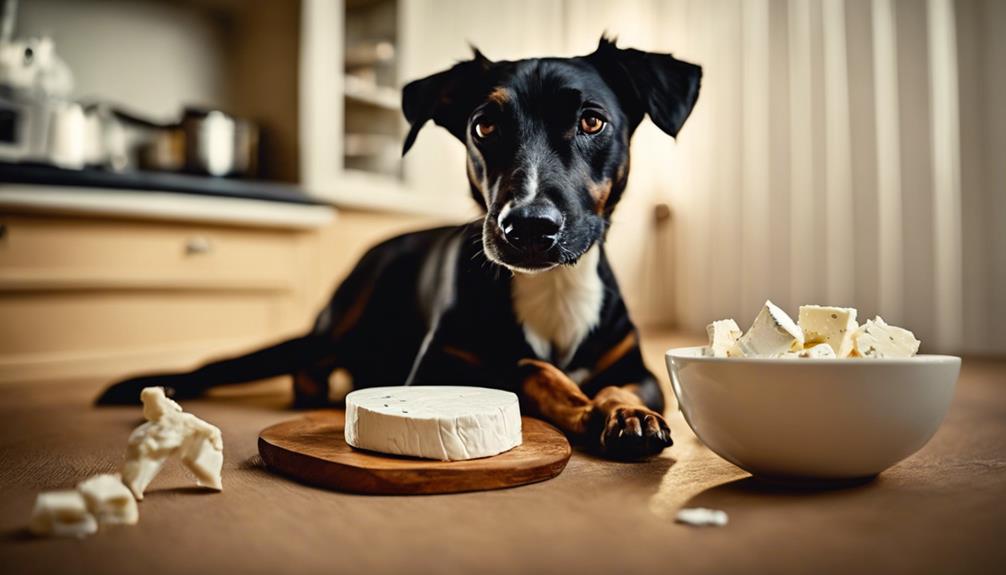
Lactose intolerance in dogs shows up with a few key signs, such as diarrhea, gas, bloating, and stomach pain, especially after they eat dairy products like goat cheese. This happens because many dogs don’t have enough of the lactase enzyme, making it hard for them to break down lactose found in dairy, which then leads to stomach issues. It’s crucial to watch how your dog reacts to dairy like goat cheese to spot lactose intolerance early and keep them comfortable.
Vomiting might happen right away for some dogs, showing they can’t handle lactose well. Loose stools are another tell-tale sign of lactose problems, causing frequent and messy trips to the bathroom. You might notice your dog looking uncomfortable or acting like they’re in pain because of the gas and bloating. Dogs with lactose issues might drink more water and get dehydrated as their bodies try to cope with the problem.
Understanding these signs is key to looking after your dog’s health and happiness.
Alternatives to Goat Cheese
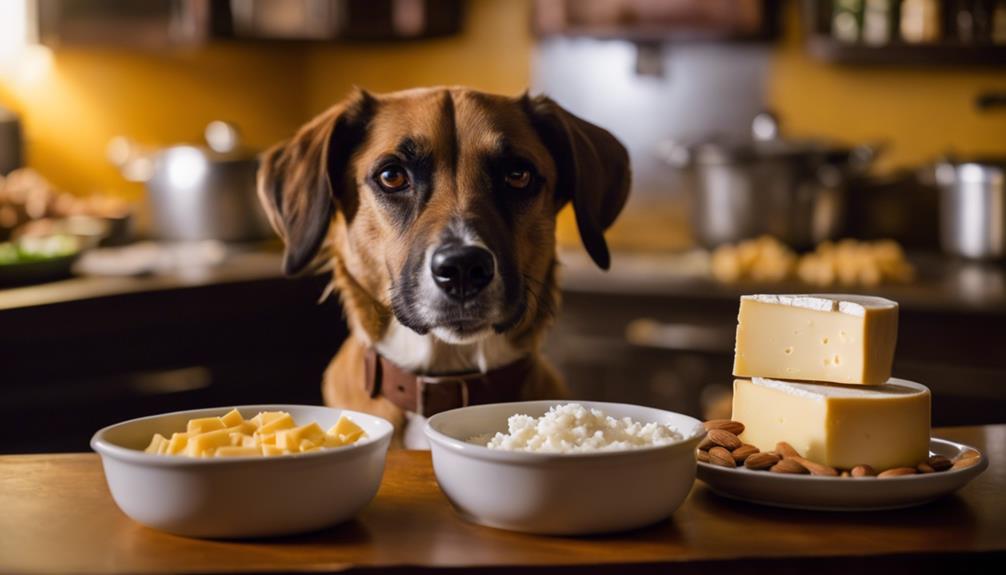
Dog owners looking for dairy alternatives for their pups who can’t handle lactose have several good options. Cottage cheese stands out as a particularly safe choice because it’s lower in fat, sodium, and lactose. It’s a nutritious pick that goes well with the benefits of mozzarella, a cheese that comes from buffalo milk and is low in salt and lactose, making it a great choice for dogs.
Parmesan cheese is known for its bold flavor and is packed with calcium and protein, which can be good for your dog. Swiss cheese also offers a unique taste and its own set of potential health benefits. These cheeses provide healthy and tasty alternatives to goat cheese for your canine friend.
Emergency Response Tips

If your dog starts showing signs like vomiting or diarrhea after eating goat cheese, it’s a signal to get vet help right away. This could mean they’re not handling the new food well. When you give your dog goat cheese for the first time, keep an eye on them for any signs of trouble.
It’s crucial to catch any problems early. Look out for any signs that your dog isn’t feeling well, such as allergies or food intolerance. Knowing your dog’s overall health status, including their age, weight, and if they have trouble with lactose, is essential.
When picking goat cheese, go for the plain types that don’t have any nasty extras that could make your dog sick. Also, remember that goat cheese is pretty rich, so give it in small amounts. This helps to avoid weight issues in your dog due to the cheese’s high-fat content.
Frequently Asked Questions
What Is the Safest Cheese for Dogs?
- Mozzarella is low in lactose, safe for dogs.
- Serve in small amounts; watch for allergies.
- Consider dog’s age and calcium needs.
What Is a Good Cheese Alternative for Dogs?
- Cottage cheese is a low-fat, low-lactose option.
- Watch dog’s reaction to dairy, noting allergy signs.
- Portion control keeps cheese treats safe for dogs.
Is Goat Safe for Dogs?
- Goat cheese is a treat, not daily food.
- Lactose can trigger stomach issues; serve sparingly.
- Allergic reactions are possible; observe your dog closely.
Is Goat Cheese Digestible?
- Goat cheese is easier on dogs’ stomachs due to less lactose.
- Control portions to prevent health issues or allergic reactions.
- Quality and type of cheese matter for your dog’s health.
